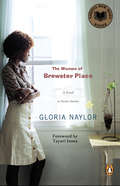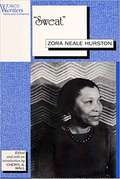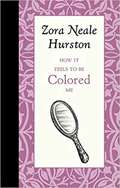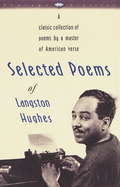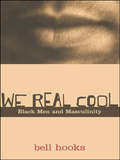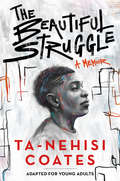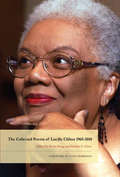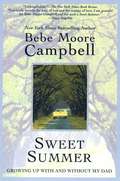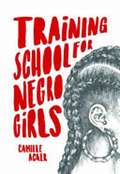Special Collections
District List: BCPS African American Literature
Description: Baltimore City Public Schools book list of African American Literature for students. #bcps
- Table View
- List View
The Women of Brewster Place
by Gloria NaylorThe National Book Award-winning novel that launched the brilliant career of Gloria Naylor (1950-2016)In her heralded first novel, Gloria Naylor weaves together the stories of seven women living in Brewster Place, a bleak-inner city sanctuary, creative a powerful, moving portrait of the strengths, struggles, and hopes of black women in America. Vulnerable and resilient, openhanded and openhearted, these women forge their lives in a place that in turn threatens and protects - a common prison and a shared home. Adapted into a 1989 ABC miniseries starring Oprah Winfrey, The Women of Brewster Place is a contemporary classic - and a touching and unforgettable read.
Sweat
by Zora Neale Hurston and Cheryl A. WallNow frequently anthologized, Zora Neale Hurston's short story "Sweat" was first published in Firell, a legendary literary magazine of the Harlem Renaissance, whose sole issue appeared in November 1926. Among contributions by Gwendolyn Bennett, Countee Cullen, Langston Hughes, and Wallace Thurman, "Sweat" stood out both for its artistic accomplishment and its exploration of rural Southern black life. In "Sweat" Hurston claimed the voice that animates her mature fiction, notably the 1937 novel Their Eyes Were Watching God; the themes of marital conflict and the development of spiritual consciousness were introduced as well. "Sweat" exemplifies Hurston's lifelong concern with women's relation to language and the literary possibilities of black vernacular.
This casebook for the story includes an introduction by the editor, a chronology of the author's life, the authoritative text of "Sweat," and a second story, "The Gilded Six-Bits." Published in 1932, this second story was written after Hurston had spent years conducting fieldwork in the Southern United States. The volume also includes Hurston's groundbreaking 1934 essay, "Characteristics of Negro Expression," and excerpts from her autobiography, Dust Tracks on a Road. An article by folklorist Roger Abrahams provides additional cultural contexts for the story, as do selected blues and spirituals. Critical commentary comes from Alice Walker, who led the recovery of Hurston's work in the 1970s, Robert Hemenway, Henry Louis Gates, Gayl Jones, John Lowe, Kathryn Seidel, and Mary Helen Washington.
How it Feels to be Colored Me
by Zora Neale Hurston"How It Feels To Be Colored Me" by Florida native Zora Neale Hurston was originally published in The World Tomorrow in May 1928. In this autobiographical piece about her own color, Hurston reflects on her early childhood in an all-black Florida town and her first experiences in life feeling "different." In this beautiful piece, Hurston largely focuses on the similarities we all share and on her own self-identity in the face of difference. "Through it all, I remain myself."
This short work is part of Applewood’s American Roots series, tactile mementos of American passions by some of America’s most famous writers and thinkers.
Selected Poems of Langston Hughes
by Langston HughesWith the publication of his first book of poems, The Weary Blues, in 1926, Langston Hughes electrified readers and launched a renaissance in black writing in America. The poems Hughes wrote celebrated the experience of invisible men and women: of slaves who "rushed the boots of Washington"; of musicians on Lenox Avenue; of the poor and the lovesick; of losers in "the raffle of night." They conveyed that experience in a voice that blended the spoken with the sung, that turned poetic lines into the phrases of jazz and blues, and that ripped through the curtain separating high from popular culture. They spanned the range from the lyric to the polemic, ringing out "wonder and pain and terror-- and the marrow of the bone of life."The poems in this collection were chosen by Hughes himself shortly before his death in 1967 and represent work from his entire career, including "The Negro Speaks of Rivers," "The Weary Blues," "Still Here," "Song for a Dark Girl," "Montage of a Dream Deferred," and "Refugee in America." It gives us a poet of extraordinary range, directness, and stylistic virtuosity.
We Real Cool
by Bell Hooks"When women get together and talk about men, the news is almost always bad news," writes Bell Hooks. "If the topic gets specific and the focus is on black men, the news is even worse. "In this powerful new book, bell hooks arrests our attention from the first page. Her title--We Real Cool; her subject--the way in which both white society and weak black leaders are failing black men and youth. Her subject is taboo: "this is a culture that does not love black males:" "they are not loved by white men, white women, black women, girls or boys. And especially, black men do not love themselves. How could they? How could they be expected to love, surrounded by so much envy, desire, and hate?"
The Beautiful Struggle (Adapted for Young Adults)
by Ta-Nehisi CoatesAdapted from the adult memoir by the #1 New York Times bestselling author of The Water Dancer and Between the World and Me, this father-son story explores how boys become men, and quite specifically, how Ta-Nehisi Coates became Ta-Nehisi Coates.As a child, Ta-Nehisi Coates was seen by his father, Paul, as too sensitive and lacking focus. Paul Coates was a Vietnam vet who'd been part of the Black Panthers and was dedicated to reading and publishing the history of African civilization. When it came to his sons, he was committed to raising proud Black men equipped to deal with a racist society, during a turbulent period in the collapsing city of Baltimore where they lived.Coates details with candor the challenges of dealing with his tough-love father, the influence of his mother, and the dynamics of his extended family, including his brother "Big Bill," who was on a very different path than Ta-Nehisi. Coates also tells of his family struggles at school and with girls, making this a timely story to which many readers will relate.
The Collected Poems of Lucille Clifton 1965-2010
by Lucille CliftonWinner of the 2013 Hurston/Wright Legacy Award for Poetry"The Collected Poems of Lucille Clifton 1965-2010 may be the most important book of poetry to appear in years."--Publishers Weekly"All poetry readers will want to own this book; almost everything is in it."--Publishers Weekly"If you only read one poetry book in 2012, The Collected Poems of Lucille Clifton ought to be it."-NPR"The 'Collected Clifton' is a gift, not just for her fans...but for all of us."--The Washington Post"The love readers feel for Lucille Clifton-both the woman and her poetry-is constant and deeply felt. The lines that surface most frequently in praise of her work and her person are moving declarations of racial pride, courage, steadfastness."-Toni Morrison, from the ForewordThe Collected Poems of Lucille Clifton 1965-2010 combines all eleven of Lucille Clifton's published collections with more than fifty previously unpublished poems. The unpublished poems feature early poems from 1965-1969, a collection-in-progress titled the book of days (2008), and a poignant selection of final poems. An insightful foreword by Nobel Prize-winning author Toni Morrison and comprehensive afterword by noted poet Kevin Young frames Clifton's lifetime body of work, providing the definitive statement about this major America poet's career.On February 13, 2010, the poetry world lost one of its most distinguished members with the passing of Lucille Clifton. In the last year of her life, she was named the first African American woman to receive the $100,000 Ruth Lilly Poetry Prize honoring a US poet whose "lifetime accomplishments warrant extraordinary recognition," and was posthumously awarded the Robert Frost Medal for lifetime achievement from the Poetry Society of America."mother-tongue: to man-kind" (from the unpublished the book of days):all that I am asking isthat you see me as somethingmore than a common occurrence,more than a woman in her ordinary skin.
Sweet Summer
by Bebe Moore CampbellAs a child, Bebe Moore spent her school years in Philadelphia, in a world of women. Surrounded by clouds of Emeraude and Chanel, supported by the strength of her mother, grandmother, aunts, and teachers, she learned by example to mind her p's and q's, to cross her t's and dot her i's. But when summer came, Bebe was sent down South to live with her father -- an extraordinary man who allowed no disability or disadvantage to stop his dreams, and whose powerful presence added a different dimension to his daughter's life. Now, in this acclaimed memoir, the bestselling author of such novels as Brothers and Sisters remembers those sweet summers and shares the bittersweet experience of growing up in 1960s America, finding a place in the world -- and discovering that family may be separated, but it can never be truly divided.
Training School For Negro Girls
by Camille AckerWhen you're black and female in America, society's rules were never meant to make you safe or free. In this "flawlessly executed work [that] reinvigorates the short fiction genre," Camille Acker's relatable yet unexpected characters break down the walls of respectability politics, showing that the only way for black women to be free is to be themselves (BUST).
In her debut short story collection, Camille Acker unleashes the irony and tragic comedy of respectability onto a wide-ranging cast of characters, all of whom call Washington, DC, home. A "woke" millennial tries to fight gentrification, only to learn she's part of the problem; a grade school teacher dreams of a better DC, only to take out her frustrations on her students; and a young piano player wins a competition, only to learn the prize is worthless.
Ultimately, they are confronted with the fact that respectability does not equal freedom. Instead, they must learn to trust their own conflicted judgment and fight to create their own sense of space and self.
